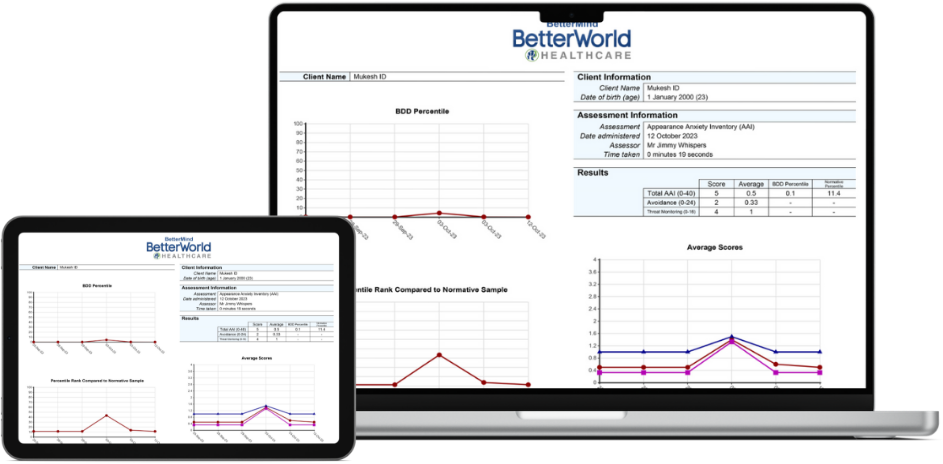Automatic Thoughts Questionnaire – Believability (ATQ-B)
Assessments
Description
The Automatic Thoughts Questionnaire – Believability (ATQ-B-15) (Netemeyer et al., 2002) is a 15-item self-report measure designed to assess the degree of believability of cognitions associated with depression. The scale does not measure the frequency of unhelpful thoughts, but rather measures the extent to which the client believes the thoughts to be true. The ATQ-B is a frequently used tool in Acceptance and Commitment Therapy (ACT; Hayes, Strosahl, & Wilson, 1999). Consistent with the ACT concept of fusion, the ATQ-B asks how much the client believed a thought when they felt depressed/sad. Given that changes in believability of unhelpful thoughts occur independently of reductions in their frequency (Zettle & Hayes, 1986), the believability and fusion of thoughts is an important aspect to target in therapy (Zettle, Rains & Hayes, 2011). The scale can also be integrated into treatment using Cognitive Behaviour Therapy. The ATQ has been found to be a reliable measure of cognitive change in depression in response to ACT and can therefore be a useful measure of progress in therapy (Zettle et al., 2011).
Validity and Reliability
Psychometric evaluation of the ATQ-B 30-item version showed that it had good internal stability in both clinical (n = 177) and nonclinical (n = 249) populations (Cronbach’s alpha = .95 and .97, respectively; Zettle, 2010, as cited in Zettle et al., 2011). Test–retest reliability for the ATQ-B over 3 months with a non-clinical sample was .85 and it correlated significantly with the BDI for both populations (r = .53 and .58, respectively), providing evidence of the measure’s construct validity. The ATQ-15 was developed by Netemeyer et al. (2002) from the original 30-item version (Hollon & Kendall, 1980). Netemeyer et al. (2002) assessed the ATQ-15 using two samples (N=434 and N=419) and found that it had a single factor, with an alpha of .96. Two additional cross-validation samples (N=163 and N=91) also showed support for the 15-item reduced version (Netemeyer et al.,2002). The ATQ-15 was found to be negatively correlated with self-esteem (r = -.63) and childhood wellbeing (r = -.38) and positively correlated to social anxiety (r = .56), neurotic / obsessive thoughts (r = .70) , and pathological gambling (r = .46; Netemeyer et al., 2002).
Interpretation
The respondent is asked to rate how much he/she BELIEVED a given thought when they had it on a 5-point scale (1 = Not at all, to 5 = Totally). Scores are summed across the 15 items to form an ATQ-B index ranging from 15 to 75. A higher score indicates a higher level of cognitive fusion with depressive thoughts. A descriptor is provided to give an overall indication of how ‘fused’ the client is to these thoughts. This descriptor is determined by the average response to the questions. ATQ-B scores can be used to track progress in therapy over time. Successful therapy should see ATQ-B scores reduce over time, reflecting a reduction in fusion. Based on ACT theory, a client’s ability to distance themselves from depressive thoughts would decrease the control exerted by these thoughts and result in a reduction of depression symptomatology. Note that the ATQ-B does not measure the frequency of unhelpful thoughts, but rather the extent to which unhelpful thoughts are believed.
Developer
Netemeyer, R. G., Williamson, D. A., Burton, S., Biswas, D., Jindal, S., Landreth, S., Mills, G., & Primeaux, S. (2002). Psychometric properties of shortened versions of the automatic thoughts questionnaire. Educational and Psychological Measurement, 62(1), 111–129. https://doi.org/10.1177/0013164402062001008
Number Of Questions
15
References
Hayes, S. C., Strosahl, K., & Wilson, K. G. (1999). Acceptance and Commitment Therapy: An experiential approach to behavior change. New York: Guilford Press. Hollon, S. D., & Kendall, P. C. (1980). Cognitive self-statements in depression: Development of an Automatic Thoughts Questionnaire.Cognitive Therapy and Research,4, 383-395. Netemeyer, R. G., Williamson, D. A., Burton, S., Biswas, D., Jindal, S., Landreth, S., Mills, G., & Primeaux, S. (2002). Psychometric properties of shortened versions of the automatic thoughts questionnaire. Educational and Psychological Measurement, 62(1), 111–129. https://doi.org/10.1177/0013164402062001008 Zettle, R. D., & Hayes, S. C. (1986). Dysfunctional control by client verbal behavior: The context of reason-giving. The Analysis of Verbal Behavior, 4, 30–38. https://doi.org/10.1007/BF03392813 Zettle, R. D., Rains, J. C., & Hayes, S. C. (2011). Processes of change in acceptance and commitment therapy and cognitive therapy for depression: a mediation reanalysis of Zettle and Rains. Behavior Modification, 35(3), 265–283. https://doi.org/10.1177/0145445511398344
Try it and see how BetterMind can enhance your practice

Support
Frequently Asked Questions
You’ve got questions, we’ve got answers. Below you can find answers to some of the most frequently asked questions. If you can’t find the answer you’re looking for, please feel free to reach out to us at info@betterworldhealthcare.com.
I can’t open test results within the Web Browser
Assessment result PDFs are opened in a new tab within the web browser. If you click the results but they do not open, your browser will be blocking the popup. To resolve this, after you have pressed the test result, look out for an alert at the top of your browser notifying you that a pop-up has been blocked, then click "Allow".
I have forgotten my password. How can I reset it?
If you have forgotten your password please press “forgot password” within the app, or on the Web Browser App login page (https://app.bettermind-app.com/login). You will receive a new temporary password via email.
Can a Practitioner access BetterMind from their Smartphone?
No, A Client /Patient can answer assessment questions on a smartphone but the Practitioners/ Users can't administer BetterMind using a Smartphone. A computer, laptop or tablet will have to be used.


